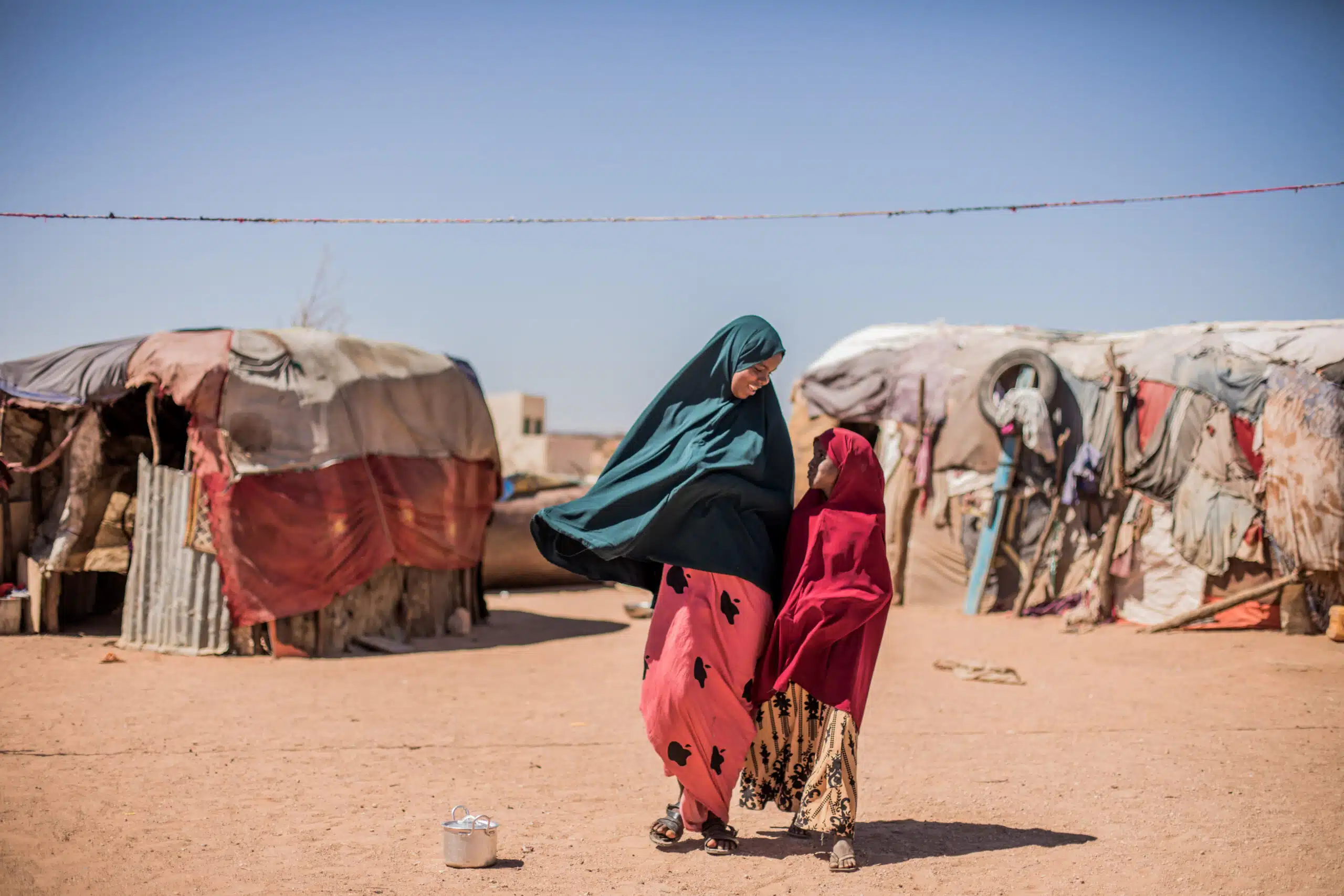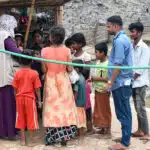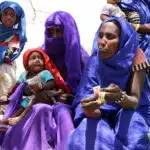Media Centre - Media release - 26 May 2023
A hidden menstrual health crisis: New research reveals multiple crises around the world affecting ability of young people manage their periods safely and with dignity

At least 500 million girls and women – that’s one in four of the world’s female population of reproductive age – don’t have what they need to manage their period, whether sanitary pads or access to a clean toilet, according to a new report.
A new report by Plan International Australia has found the effects of the so-called polycrisis – the simultaneous and overlapping crises of cost of living, climate disasters, food insecurity and conflict around the world – has severely affected the ability of young women and girls to access menstrual health and hygiene information and products, and safely manage their periods.
In Australia, a recent YouGov survey commissioned by the girls’ rights and humanitarian organisation found that almost 6 in 10 Gen Z and Millennial women are finding it more difficult to pay for menstrual hygiene products due to the rising cost of living, with more than half (53%) of Gen Z and Millennial women finding it more difficult to pay for menstrual pain management medication or treatment.
The situation is just as bad, if not heightened, for their counterparts worldwide. In a global survey that reflected the experiences of tens of thousands of young women in the Global South, 90.9% of sexual, reproductive, and menstrual health experts surveyed said the current global crises have affected the ability of the girls and women they work with to access menstrual health management information or products, while 96.3% said compared to before the current polycrisis, girls and young women are finding it harder to pay for menstrual health products. This has resulted in some adolescent girls engaging in exploitative sex to pay for menstrual health products, leading to increased rates of sexually transmitted infections and unwanted pregnancies, and a significant increase in early and forced marriage, the research found.
Drawing on data and evidence from 168 frontline specialists – who each work directly with hundreds of adolescent girls – across 44 country offices and four regional hubs where Plan International works, the report, A Tough Period, released for World Menstrual Hygiene Day on 28 May, found:
- 91.1% of the experts surveyed said the polycrisis has adversely affected the ability of adolescent girls, young women and people who menstruate to access sanitary products.
- Globally, 90.9% of those surveyed said the current crises have affected their ability to access menstrual health and hygiene management information
- 96.3% said compared to before the current polycrisis, adolescent girls are finding it harder to pay for menstrual health products.
- Some 80.2% said it was harder for women and girls to find water to manage their periods safely – a particular concern for SRHR experts working in drought-stricken countries.
- 51.6% reported that women and girls are now using makeshift materials, such as used clothing, towels, old cloth, cottonwool and rags, while they are menstruating, in lieu of products like sanitary pads. This predisposes them to a number of infections, and reproductive and urinary tract infections that can cause birth complications and infertility. The health risks are even higher for girls who have been subjected to female genital mutilation and cutting (FGM/C), as obstruction of the vaginal opening can result in a build-up of menstrual blood in the vagina and uterus, along with painful and irregular periods
- Almost one-quarter of experts (22.9%) reported that adolescent girls are engaging in survival sex to pay for menstrual health products, which can lead to and exacerbate other risk factors, such as sexually transmitted infections and unwanted pregnancies.
- Two-thirds of respondents (67%) attributed difficulties accessing menstrual products as a contributing factor to increased child, early and forced marriage.
In the African country of Mali, for example, period poverty is an all-too-common phenomenon. People who menstruate either don’t have access to menstrual products and WASH (water, sanitation, and hygiene) facilities, or in the rare scenarios where they do, they don’t have any way of disposing used sanitary pads.
“Before, each month, during my periods, I kept to myself, staying in corners away from crowds, both at school and at home. I used to be so ashamed and scared that the rags I used might fall out, or move or that my clothes would be stained,” says Kologo, a teenager.
“Rising inflation makes menstrual health products unaffordable for a lot of women and girls, and in a society of large-scale food insecurity and conflict, finding access to food and shelter outweighs other important needs like access to menstrual health products. Especially as menstrual health is seen as an issue of just women and girls, it is not seen as everybody’s problem. This leaves a lot of women and girls dreading their menstrual periods and having to make do with unhygienic or uncomfortable solutions to handle their periods,” says a Gender and Protection Officer from Nigeria in the report.
“My country has a military coup and ongoing conflict, and the situation is getting worse and worse. Increasing commodity prices, limited access or lack of electricity, limited access or lack of clean water, and the condition of internally displaced people because of conflict all contribute to the difficult access to menstrual health products and ability to stay clean during their periods,” adds a Sexual and Reproductive Health expert in Myanmar.
A gender consultant in Malawi reports that “girls and women who menstruate use any available rag to cater for their periods, which predisposes them to candida and other infections.”
In cases where women don’t have the resources to manage their periods, experts report that some are “staying away from school, markets and other public spaces during their menses” – essentially withdrawing from society. Another Sexual and Reproductive Health Officer, from South Sudan, reported incidences of adolescent girls and young women intentionally falling pregnant as a way of avoiding menstruation and its associated costs – at least for the duration of the pregnancy and breast-feeding.
Plan International Australia CEO, Susanne Legena, said: “This new report has laid bare how the compounding crises the world is facing – from the hunger crisis in the Horn of Africa, Yemen, Syria and many other countries; to climate disasters, such as the cyclone last week that razed some of the poorest settlements in Myanmar and Bangladesh; to horrific conflict and wars as we have witnessed in Ukraine, and Sudan; right through to the cost of living pressures bearing down of almost all corners of the world – have exacerbated period poverty, the struggle many low-income girls and women face while trying to afford menstrual products, and period stigma. We are seeing this in Australia, and we are seeing this right across the globe, especially in the world’s most vulnerable communities.
“These issues have existed for a long time, but we know that the polycrisis has in many cases made the situation far, far worse – especially for girls.
“For millions of girls in the countries where Plan International operates, privately and safely managing menstruation and addressing the taboo and stigma associated with it is vital to ensuring their human rights, health and dignity – and these are all under threat right now.”
A recent YouGov survey of more than 500 Australian people who menstruate, in both city and regional areas, aged 18-42 found:
- Almost 6 in 10 Gen Z and Millennial women are finding it more difficult to pay for menstrual hygiene products than they were before the current cost of living crisis (57%). This figure rises to 64% for Gen Z.
- More than half of Gen Z and Millennial women are finding it more difficult to pay for menstrual pain management medication/treatment than previously (53%). Again, Gen Z are feeling it more with 57% finding it more difficult.
- When asked in which ways difficulties paying for menstrual hygiene medication products and/or menstrual pain management medication are having an impact on other areas of your life, the main impact was on mental health and well-being (37%). This was particularly an issue for those outside of the capital cities (48%), those not working (45%), those renting (46%), and those on household incomes under $50K (47%).
- More than 1 in 4 (26%) of Gen Z respondents said that the difficulties they now experienced in paying for period products and period pain management had impacted on their sexual relationships.
- 16% of Gen Z people who menstruate said it was impacting their education; 16% on their workplace participation.
Plan International Australia youth activist Angelina said: “Over the last few years in particular, as cost of living has worsened, I have really tried hard to destigmatise periods for myself, but there are always those elements of ‘ohh if I’m not changing my period products enough, will I smell? Will there be leakages?’ That’s going on the back of your mind.
“If your period lasts longer than a week, that is a quite a long amount of time to be worrying about something in the back of your mind, which you wouldn’t have to worry about if you had adequate access to menstrual products – or if you did not have a uterus,” she said.
On any given day, around 300 million women and girls globally will have their periods, and all too often in crisis situations, girls, women and people who menstruate struggle to manage their periods with dignity, as access to basic supplies and essential health services becomes limited.
“In low-income countries in particular, menstrual products are seen as “luxury items”, which girls and women will often forgo so their families don’t have to cut back on other essential items, like food, baby milk or school supplies,” Ms Legena said.
“All girls and women around the world should have access to sexual and reproductive health rights, and no one’s wellbeing should be limited by their period.”
Plan International Australia is currently distributing dignity kits to communities in need all around the world. A Dignity Kit has all of the essentials people who menstruate need to manage their periods during a crisis. The kit includes menstrual pads, body soap, washing soap for clothes, toothbrushes, shampoo and toilet paper. You can pay it forward and purchase a dignity kit, which will help a girl manage her period safely and with dignity, here.
Media contacts


